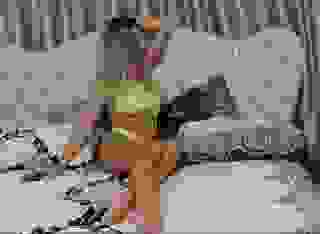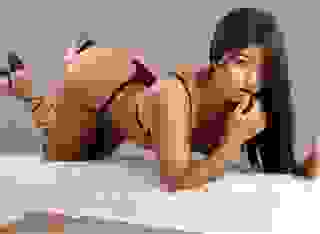- Novels and Novellas
- Wolf Creek Ch. 11
Note: You can change font size, font face, and turn on dark mode by clicking the "A" icon tab in the Story Info Box.
You can temporarily switch back to a Classic Literotica® experience during our ongoing public Beta testing. Please consider leaving feedback on issues you experience or suggest improvements.
Click hereAda Albin Raven and Frank Wolf were married on a beautiful, clear and crisp, spring morning in 1927 in the glade by the cascading eastern arm of Wolf Creek about midway between Brook House and Hagen's Saw Mill in the lower reaches of Hahn's Peak. Ada had wanted to be married in the open air of the Rocky Mountains, and she could think of no more beautiful spot than the one where she and Pete Fair had met and made love. She meant no disrespect for her new husband, but her afternoons spent dallying with the young Pete Fair in this glade had been the happiest of her recent memory, and she wanted to recapture that atmosphere for her second wedding day.
The construction of the main lodge at the Wolf Creek Ranch had progressed quickly and smoothly and there would be a large open space under a massive roof and protected by log walls for the wedding party to retreat to. If the failure of his latest attempt to court Ada had been reflected in William Hagen's demeanor toward her after she had stood him up for their dinner appointment in Denver's Brown Palace Hotel—and had not returned to her room the entire night while he frantically kept trying to get in touch with her—this never became apparent to Ada. Hagen gave the construction of her dude ranch complex priority. Ada, in turn, came to Denver frequently to consult on the interior design work for his other projects—and when she was in Denver, Pete Fair continued to find a way to meet with her alone and ravish her body, as she melted to, with his masterful, youthful cock play.
William Hagen did not attend Ada's wedding to Frank, and if she had any inkling that he could not bring himself to do so because it was just too painful to lose her in marriage to another man yet again, she did not permit herself to think about it. Pete Fair did attend, however, while being on the scene to supervise some aspect of the lodge construction. And Ada's choice of their love nest for her wedding was not in the least lost on him. Aunt Martha and her Thaddeus, of course, were there as well as young Hugh, who at twelve, no longer could be called little; he was growing up with promise to be straight and tall and handsome. And to Ada's delight, her other surviving son, Dan, also was in attendance, accompanied by her old entrepreneur friends, George Vaughn and James Shaffer, who declared not only that they wanted to accompany Dan on the journey but that they also wanted to come see the miracle that was rising in the hidden Colorado Valley that Estelle Hopewell so famously had written about. And Estelle was there along with the novelist J. Harvey Kincaid, scouting, they said, for where they were going to force all of their literary and artistic friends to congregate as the ranch's first paying guests. Estelle, in particular, was claiming that this was her project, that it was her idea and initiative to create a celebrity hideaway here in this Colorado mountain valley—and to a great extent she was justified in thinking so.
Estelle's husband was no where to be seen. He had become very taken with the activities of Adolf Hitler and the Nazis in Europe and was using his extensive prestige in the United States as the modern adventurer darling to promote U.S. isolationism in the disturbing gathering of storm clouds across the Atlantic. Estelle had decided that she couldn't stomach his politics—at least not as much as she could stomach the masterful lovemaking of the famous rugged adventure author, J. Harvey Kincaid.
Besides Ada's now-feeble minister father, of the surviving family members on both sides, only Frank's son, Jessie, was not at the wedding. Frank had established in no uncertain terms that Jessie would not be there; he was to keep to his side of the extensive Wolf holdings if he didn't want Frank to pull the financial underpinnings from under him. And Jessie might have a mean-streak still, albeit it reputably was being muted with maturity, but no one ever accused him of being dumb.
After the ceremony, the small group of friends returned to the nearly completed lodge and Frank filled the guests with fine food and wine, while the charismatic J. Harvy Kincaid mesmerized those gathered with his fascinating story telling of men combining their talents and strengths to successfully fight the challenges of the wilds and the elements of nature. While J. Harvey entertained, Ada and Pete slipped away momentarily and he pulled her behind one of the small outbuilding sheds, pushed her against the rough planking, her palms and cheeks against the wood, hiked up her wedding skirts and fucked her deeply from behind. As Ada turned her face to his for a sensual kiss and sighed and moaned for the working of him inside her, her mind could not help but surface the irony of where this had all started back behind the hen house in Natowa, Missouri, when that somewhat bumbling evangelist Hiram Laffler had pushed her against the wall and been the first to fill her other channel with throbbing manhood. As ironic as the situations were, however, Ada would not have asked for anything different. She had grabbed life by the balls and turned it to her own pleasure—and fully intended to continue doing so. Frank would not suffer. She would love him to exhaustion later that night. She had never left a man unsatisfied. And if there was a way to get George Vaughn and James Shaffer alone while they were still here, she would give them a workout as well. And she was capable of doing all of this and remaining the perfect hostess for all of her other guests.
By the spring of 1929, the new dude ranch was completed and the first guests were enjoying an extended residence. Ada had seen to it that the rooms of all of the writers were well appointed with everything they needed to write and that all of the windows from these rooms overlooked an inspiring scene but did not overlook the rooms of any of the other guests. To the extent they'd want and/or need total privacy for their writing, they had it. As for the fine artists, one of the buildings that looked like a barn had, in fact, been especially constructed for the needs of the painter and had been oriented to catch the light perfectly. The days were reserved for private work and contemplation, but from the point of the hour before sundown, when rocking chairs aplenty and drinks and nibbles were set up on the wide verandah running across the downslope front of the lodge, through the supper hour, to the salon gathering immediately afterward, where the various celebrity residents could mingle and exchange bantering and jibes and brilliant ideas, the residents were thrown together. This, unless they continued to seek privacy, in which case they could take supper in their rooms.
J. Harvey Kincaid quickly became the center of the supper table conversation. He was a veritable stallion of a man, the epitome of the rugged, handsome, square-jawed, determined man in his virile late twenties battling the elements, whatever they were—and winning and possessing what and how he pleased. His stories were awe-inspiring fables of man, in concert with other men, battling the elements and prevailing. And the way he told them to those who worshipped at his feet was spellbinding. Most of those who retreated to the ranch when he was there—and he continued to come to the ranch three or four times each year for some three decades after it opened—were caught in his web and refused to miss either the communal dinners or the after-dinner salon.
As driven as most of members of the art and literary set were, however, most of them then retired to their own well-appointed rooms to work late into the night on their craft. Some, however, including such as the writer of hard-boiled detective stories, whose Catholic wife would never divorce him, and the bitchy but brilliant New York playwright whose lesbian lover would never accept the reality that the playwright was bisexual, took advantage of this time and of having "coincidentally" come to this private haven at the same time, to fuck for long hours behind closed doors.
After the first few days of this initial gathering, the atmosphere became too heady for the far more simple-lifed Frank Wolf, and he "discovered" that he needed to get out on the range for a week or two and ride his fences to make sure they were being maintained. Ada regretted his leaving, but she knew that he wasn't rejecting what she had made of the ranch but could only personally take it in small doses. She also regretted the thought of her bed being unoccupied for as much as two weeks, but Estelle very soon erased that concern. The swishing tail of Frank's horse was barely out of sight before Estelle had taken Ada's hand and the two had retired to Estelle's rooms, where Estelle slowly disrobed Ada, sat her on the edge of the bed, and slowly descended her ruby-lipped kisses down between Ada's spread legs and made Ada arch her back and claw the bedspread with her fingernails and pant and moan and writhe to multiple orgasms under Estelle's expert ministrations.
After Frank had been gone nearly two weeks, J. Harvey Kincaid came to Ada one morning and pouted that he was bored and that it was all her fault.
"I'm sorry to hear that," Ada said, most distressed because she easily discerned that Kincaid would be the ranch's mainstay attraction of other celebrities for years to come if he was kept happy.
"Yes, life just isn't exciting enough here. I'd actually come to hunt the elk that I was told were the most magnificent here. I'm told there's a good dude ranch for that up in Wyoming, though."
"Hunt elk?" Ada said. "Yes, we have elk up on the timberline on Hahn's peak, no more than a four-hour ride from here. I often have gone up there to paint. There are elk in some of my paintings, you know."
"Yes, I know, Ada," Kincaid said and he gave her that big, handsome, melting smile he was so well known for. "The elk in your paintings are what first attracted me to you."
"My elk?" Ada said with a little frown. "That's quite a compliment for a woman, you know."
"Ah your beauty needs no compliment, my dear," Kincaid said smoothly. "It exists above description. There, in fact, is no description that could do justice to your beauty."
"So, now you are mocking me," Ada retorted, her eyes dancing, telling him both that she was in good humor and that he'd struck deeply with his arrow.
"It is the spirit of the elk that moves me. Have you not seen that in some of my writing?"
"Yes, I have. I've seen that you've used several beasts of the wild like the elk for your images of perfection."
"Ah, yes, you do understand then. I see them as everything I must possess. That's why I want to hunt the elk—not for the sport of killing them, really, but for the need to possess them and what they represent. But . . ." and here he sighed, "it seems I won't be hunting elk here."
"We, of course, could lay on such an outing for you," Ada said hastily. She didn't want to see what was likely her golden goose slip the noose. "It's a pity that Frank is out on the range. He could have taken you on a hunt. But I can get one of the ranch hands he didn't take with him . . ."
"Ah, foisting me off on the hired help," Kincaid said. He was smiling and gave a dry little laugh, but Ada was fearful that he more than half meant he thought he was being insulted.
"Well, we'll have to . . ."
"You could take me up." Kincaid said.
"Me? But I'm no hunter. I . . ."
"You are a painter, and you said yourself that you've already been to the timberline and captured the elk on your canvas. You know where to go. You could take me."
There was nothing else to do. Kincaid had boxed her in. But there was no way they'd be able to do this within the confines of a day. So, Ada spent the rest of the day preparing to leave the ranch in the hands of others and in gathering what she and Kincaid would need for the overnight outing. She called down to Slater, and Aunt Martha arrived by evening to take over the management responsibilities.
The worst of Ada's preparations turned out to be Estelle, who, at first declared she was going too. But Kincaid scotched this, saying she would distract him too much with her radiance—that he couldn't have eyes for the elk while she was there. Then Estelle pouted until Ada took her into her bed after the evening's salon and left her exhausted and at least temporarily satiated when the early morning departure time arrived.
When they first started working their horses up into the foothills of Hahn's Peak, Ada was quiet. She more than a little resented this somewhat petulant demand on her time and resources that the self-possessed novelist had made. She had little idea how to track elk and Kincaid had taken her away from all of her other guests. But J. Harvey Kincaid was a patient man, a very patient man. And he proved to be a fascinating travel companion, as profound, humorous, and lyrical in his observations of what was going on around them in the wild, beautiful Colorado mountain wilderness as he was in an opulent dining room amid gleaming silver and shining china and crystalware.
The two rode across the isolated ridges for the morning and afternoon, straight for the tree line, where Ada had seen elk in her painting excursions. By evening their horses were worn out and although they had seen elk, it had been at a great distance and only fleetingly; there had not been time or opportunity for Kincaid to get off a rifle shot. Ada secretly was pleased with this, as she hated any thought of the killing of any of those magnificent beasts.
As the sun was setting, Kincaid suggested that they just lay by in a stand of cottonwood trees next to a fast-running stream in a sheltering ravine. They ate that night over an open fire, leaning against the saddles they had slung on the ground between the bank of the stream and a line of cottonwoods. J. Harvey was his charming best, weaving a story of primeval earth just for Ada. He told her of the village of simple, close-to-the earth people of beauty and purity who were on the eve of being invaded by the despoilers of the outside world. He described in great detail of the last night of lovemaking across the village, with the men warriors of the village knowing that they had to meet in the new dawn in a cataclysmic and surely final battle in the meadow separating their primeval forest from the cruel modern world.
Kincaid focused on one woman of the village who knew the precise moment that her husband and her only surviving son died in this battle, and how, in her grief, she ran deeper into her forest, only a short time ahead of the invading "moderns" to die in the forest, to become absorbed by the earth. He told in poetic words how, exhausted, she leaned into an old oak tree, which slowly morphed into her lost husband, making deeply possessive love to her there, as she was absorbed into her virile oak of a husband, gone to this world when the despoiling "moderns" reached and then passed by the base of the oak. The intriguing metaphors of Kincaid's imagery possessed Ada's soul as his rich voice rolled over her, using the words of earthy love that did not sound dirty on his lips and that stirred her to the quick.
The air was crisp and slightly chilly, and Ada had been siting close beside him as they leaned against his saddle and shared the single blanket to aid the glow of the campfire in warding off the cold wind. As Kincaid melded his story to slowly enfolding Ada to him under the blanket, he reasoned in whispers that they would be so much more comfortable making maximum use of their shared body heat. And Ada, lost in his storytelling believed him and melted into him.
The story was sad and poignant all at the same time and Ada was crying. Kincaid kissed her tears away. And he kissed her cheeks. And he kissed her lips. He told her not to cry, in that mesmerizing poetic baritone voice of his. He told her he loved her. She whimpered that she had disappointed him; that he had not bagged the elk he wanted. He asked if she hadn't understood his story at all—that she was the elk. The elk only symbolized her and it was Ada he needed to possess. Ada was the spirit of his elk.
He asked Ada if she trusted him and if she loved him too. And then, at that moment, she surely did. He unbuttoned her shirt and comforted the hollow of her neck with his lips, and then he cupped her breasts and comforted her nipples and her belly with his hands and his tongue.
He unbuckled her jeans and slowly unbuttoned the fly, all the time telling her that he loved her and wanted to take care of her. And asking her if she loved him and trusted him. And she did and told him so. And then he told her he wanted to be her virile oak. That he wanted to fully bond with her, for them to melt together in one unit. Then he unbuttoned himself and turned her and placed his lips and tongue where Estelle had so recently played and was pushing his huge manhood between her lips.
At length he moved her again, on her belly over the saddle, and he knelt behind her between her spread legs and fucked her long and deeply, all the while making love for her with the poetic murmurings of his rich baritone voice. He possessed her fully and several times and in various positions in front of the crackling fire throughout the chill spring night. Her young, masterful, virile oak.
The next afternoon Ada and Kincaid were riding over the last ridge and within sight of the Wolf Creek Ranch compound on the hillock below them, when the riders who had been sent out to find them did find them. They spoke briefly and breathlessly to Ada, who, leaving all of them behind, spurred her horse in a hell bent for fury tumbling ride down the mountain slopes. But she was too late. Frank Wolf was already gone when she reached the lodge. His horse had been spooked by a rattlesnake at the far reaches of their fenceline, and the horse had thrown him and then landed on top of him, crushing the man's ribs and piercing several of his vital organs. The ranch hands with him and improvised a litter and brought him back to the lodge as gently as they could. But the damage to his body had been too extensive. He had, as he had frequently said he wished to do, died riding the range of his ranch.
- COMMENTS








